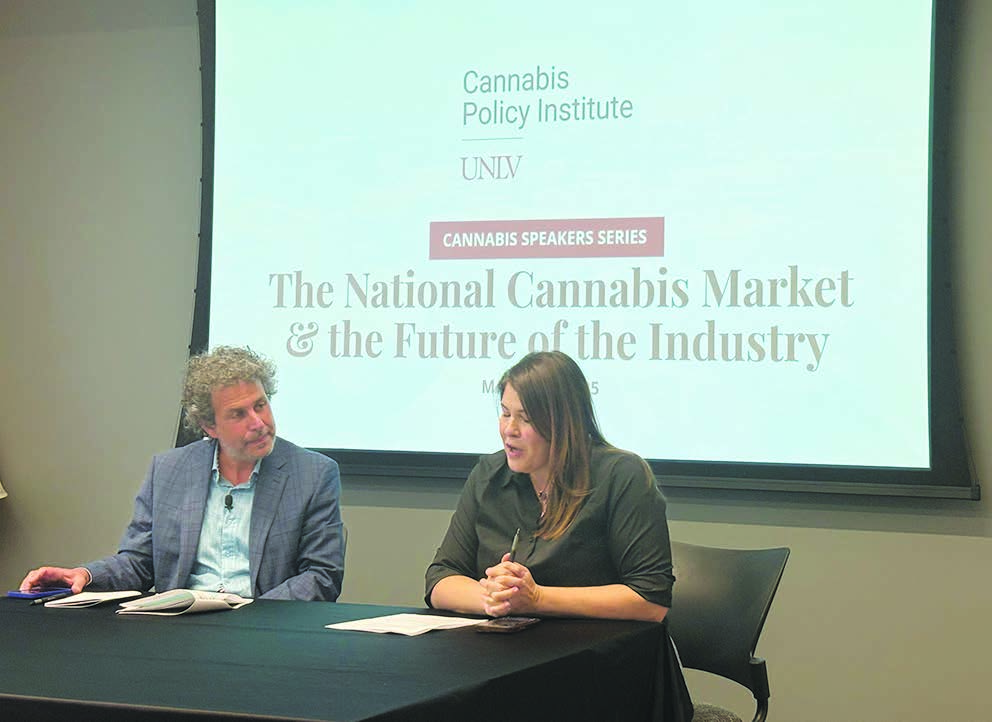
Robin Goldstein, who leads the Cannabis Economics Group at the University of California, Davis, and UNLV Cannabis Policy Institute Director Riana Durrett open the discussion on where cannabis will be most successful should interstate trade for it be approved throughout the United States. Nevada ranked fifth in the report out of the 25 states listed.
Editor’s note: Este artículo está traducido al español en la página 8.
In the United States’ burgeoning marijuana industry, state lines are more like walls as the drug’s Schedule I narcotic status alongside heroin and LSD makes interstate commerce illegal.
But one day, maybe over the next few years, those barriers will fall, whether through de-scheduling or legalization with a new federal agency to regulate trade between states.
Once businesses can send marijuana products coast to coast, current markets, regulatory burden and the varying costs of doing business will help decide which states beat out the others in the market, University of California, Davis economist Robin Goldstein wrote in a report with UNLV’s Cannabis Policy Institute.
“Every dispensary in Nevada is suddenly carrying not just Nevada cannabis but cannabis from California, cannabis from Massachusetts, cannabis from Montana,” he said Monday afternoon during a panel discussion on his report.
“Economically, the biggest, foremost implication is price competition.”
There already is some interstate trade with intoxicating hemp, which only exists because of a loophole in the 2018 farm bill trying to legalize industrial hemp.
Of the 25 states Goldstein ranked in his “Where Will Weed Win?” report, which offered an analysis of how different states may perform when interstate commerce is possible, the Silver State came in fifth.
Nevada is helped by some of the lowest electricity and land costs in the country and relatively cheap labor, according to the report. Neighboring California, which placed third on the list, has high costs across the board but is buoyed by a decades-old industry and cheap retail costs.
Of the 25 states Goldstein ranked in his “Where Will Weed Win?” report, Nevada ranks No. 5.
Marijuana around Las Vegas is more expensive, but prices in the state are coming down. The lowest price for a pound of cannabis flower has been cut in half over the past year, with only Michigan having a bigger drop, according to the report.
Part of that decline is due to the cost of cultivating marijuana in a greenhouse coming down. Nevada, due to its climate, has no real outdoor growing industry, said Goldstein, who leads UC Davis’ Cannabis Economics Group.
“If you go back two years ago, Nevada’s nowhere near the bottom 10 in cost or prices, and now it’s broken into the lower price tier and will be more competitive because of this development of the industry,” he said.
But the economist is quick to admit that Nevada is a “dark horse” in the top five with its smaller population, also acknowledging that the state largely hasn’t capitalized on Las Vegas’ 41.7 million visitors.
That’s because buying weed on the Las Vegas Strip is illegal. And despite concerns about rising prices in the corridor, it’s still where most visitors stay, according to a study from the Las Vegas Convention and Visitors Authority.
Assemblymember Max Carter II, D-Las Vegas, has pushed for a solution where dispensaries can drop off products to kiosks at nongaming locations. Goldstein envisioned another option where a specialty district could relax some of the strict standards now in place.
“Nevada has a foundation with lots of great cannabis businesses here that is primed to be built on, primed for growth, in the sense that there’s a much bigger market here that is servable,” said panel moderator Jordan Wellington, a partner at a consulting firm focused on cannabis.
Another “big opportunity” Goldstein sees for Las Vegas is at large venues like Allegiant Stadium, especially with the Las Vegas Valley’s increased focus on sports and mainstay nongaming activities like concerts.
Part of breaking through is getting past the current image people associate with current marijuana consumption lounges and normalizing its use in other places, panelists said.
“It turns out you can smoke it on the street. You can eat an edible before you go out. No one’s interested in that. What people are interested in is socialization,” Wellington said, adding that there is a need for activities alongside consumption.
Goldstein said the same, joking that Allegiant Stadium wasn’t referred to as an “alcohol consumption lounge.”
“When you look at entertainment and hospitality, it’s not about what the product is that’s being consumed there. It’s about the entertainment experience,” he said.
“Until (marijuana is) just viewed as a complementary part of other experiences, and it’s not a single-purpose establishment, I think it’s always going to be limited in its growth.” kyle.chouinard@gmgvegas.com / 702-990-8923 / @Kyle_Chouinard

